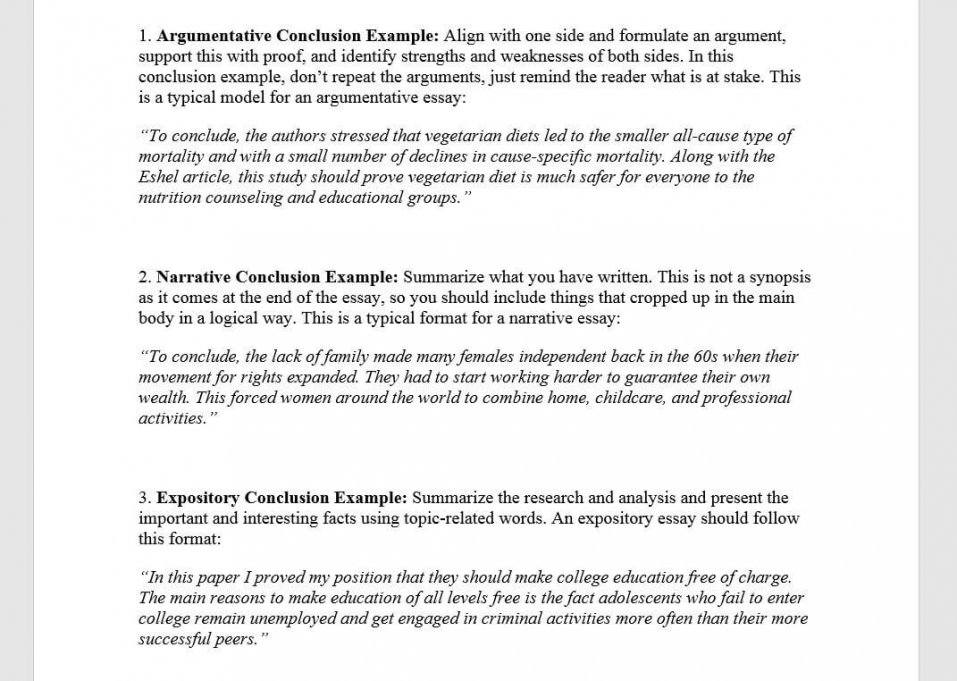
As a student, when you write a thesis or an essay, it is vitally important that you write a good conclusion. This article sets out to describe what is required and how to go about it. Although it refers to thesis writing, it applies equally to any academic assignment such as an essay or research paper.
Conclusion examples can be found for all types of academic writing but here you will find the basics for most of the work you will be required to undertake at university or university. Make sure you allow time to write your conclusion example and review it several times prior to submission–it will pay dividends eventually.
The length of your conclusion will depend on the type of assignment and will vary from one page for an essay to three or more pages for a thesis.
In a Nutshell
The conclusion examples in this article cover just some of the types of academic assignments you may have to deal with, but in general, the same rules apply across the board. To summarize:
• Set out the parameters. Repeat the opening statement but re-word it to suit the context.
• Paraphrase the main points and the results of your research. Look at each one and make sure you have covered the essence of it without too much detail.
• Reinforce your stance on the topic but be as objective as possible.
• The objective is to leave the reader satisfied that you have answered the question(s) raised and proven your case.
Conclusion examples help you review your work and improve your writing by making you reconsider the points raised. If you are not convinced by your own conclusion, you cannot expect the reader tobe.
Conclusion Example: Definition
The conclusion example is the final section of your thesis, comprising the closing paragraph or sentence and the summation of the points made in the thesis. Whereas the introduction sets out the reason for writing the thesis in the first place, the conclusion justifies the thesis. The aim is to help the reader understand the main points and if you have made your case well, to accept your stance on the subject. A conclusion example is an inspiration for you to come up with your own conclusion.
- ✓ 3D live preview of your individual configuration
- ✓ Free express delivery for every single purchase
- ✓ Top-notch bindings with customised embossing

Step-by-Step Instructions
All conclusion examples have these key components:
-
Restatement of the thesis
-
Summation of the key points
-
A closing statement
To write a conclusion to your thesis you should:
Take the introductory paragraph and rewrite the opening statement. This forms the basis of your thesis and reminds the reader what it is about.
Summarize the arguments or points made in the main body of the thesis. If you are writing a research paper, did you answer the questions raised? If not, go back into the main body and change it. Remember, the conclusion example is not the place for introducing new ideas or anything that was not explored in the main body.
Write the final sentence in a way that compels the reader to want to investigate the issue further or to take your stance on the topic, depending on the intention of the thesis in the first place.
A word of warning—if your thesis fails to prove your case, or the results of your research do not support your opening position, do not conclude that your point is proven. A negative result is still a result and you must show that in your conclusion example.
Conclusion Examples
There are several conclusion examples to be found depending on the type of academic assignment undertaken; these are just three of them.

Conclusion example for academic writing
An academic assignment can be an essay or a thesis, maybe even a research paper. Each of these differs in how the main body is presented, but the conclusion example will follow the same format.
In reviewing the conclusion examples below, you will see that the conclusion is possibly the most important part of the assignment. Obviously, the research is important and you must make sure you cover all the issues in the main body, but a well-written conclusion should enable the reader to understand your point of view without having to read the whole document.
FAQ's
You’ve made your points, you’ve proven your case (or not), now you need to leave the reader feeling either convinced or informed. To do that effectively, you need to master the art of ‘How to write a conclusion‘. Reading conclusion examples is a great idea for understanding the tone and type of words that need to be used in a conclusion.
Any conclusion example must include a summary of the key ideas and the most important issues raised throughout the thesis or research paper. This helps the reader to feel as though they completely understand the topic that they’ve been reading about. It also assists fellow researchers in the academic world with quickly accessing the results of your study for their own research.
Do not include any points that were not discussed in the main body of the thesis. This is not the place to add any additional points or ideas. If you’re deciding whether or not you should add something into your conclusion, read through the body of your thesis again to see if/how extensively this point was discussed and then make your decision.
It’s a great idea to start with a transition word that leads the reader into the conclusion. Good transition words would be ‘in conclusion’, ‘thus’, ‘therefore’ and so on. Then, paraphrase your thesis statement before you begin summarizing the main points that were discussed in the body of the thesis, report or essay.
A good conclusion example is one where the points that were given in the main body of the essay are summarized and expressed in a clear, but compelling way. A good conclusion should give the reader a feeling of closure and complete understanding about what they’ve read. It’s important that the thesis statement is paraphrased and also placed in the conclusion.
The final paragraph of the conclusion example should be compelling and succinct. The closing sentence is your last opportunity to convince the reader and leave a lasting impression of your thesis statement and what you’ve contributed to the academic community. Link the end of the conclusion with your introduction- perhaps refer to a fact or anecdote.
References
Pro Essay Writer: “How to Write a Strong Conclusion Based on the Outstanding Essay Conclusion Examples”, in: Pro Essay Writer, https://pro-essay-writer.com/blog/essay-conclusion-examples, Last accessed 19th Feb 2020.



